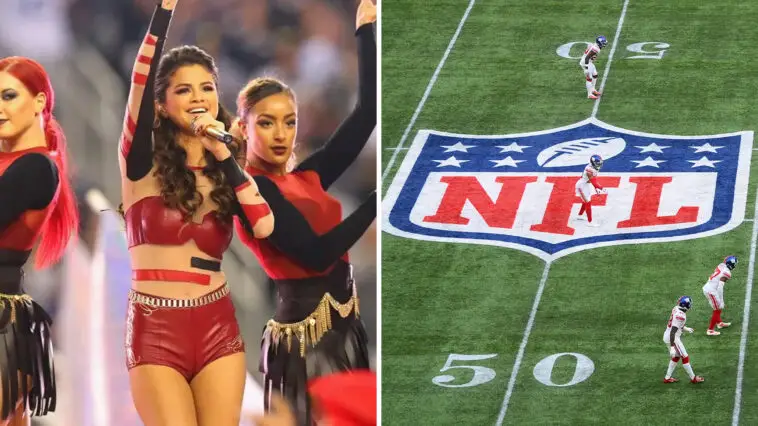
In a shocking turn of events, it seems the National Football League (NFL) has decided to take its desperate quest for woke brownie points to a whole new level. Following in the footsteps of the ever-enigmatic Beyoncé, pop sensation Selena Gomez has been chosen to sing the ‘Brown National Anthem’ at the next NFL game. Yes, you read that right, folks. Get ready for a cringe-worthy display of performative progressivism that will make your head spin faster than a Beyoncé twirl.
In this era of unparalleled social justice grandstanding, where celebrities are tripping over each other to showcase their virtue, the NFL seems to have joined the ranks of those who believe that pandering to the woke mob is the way to go. Apparently, singing the traditional national anthem was just not enough for them anymore, and now they’ve decided to debut a brand new anthem to cater to the needs of the overly sensitive and the perpetually offended.
The ‘Brown National Anthem,’ as they’re calling it, is a musical ode to all things woke, a celebration of diversity, and a masterclass in how to be politically correct. Because, you see, in this brave new world of ours, it’s not enough to simply celebrate America and its shared values; we must also acknowledge and celebrate every single identity group individually, or risk being labeled as heartless, bigoted, and out of touch.But let’s take a step back and examine the absurdity of this situation. What exactly is the purpose of a ‘Brown National Anthem’? Is it meant to replace the existing national anthem? Are we now going to have a separate anthem for every skin color, ethnicity, and gender identity? If so, we might need to invest in some industrial-sized songbooks just to keep track of them all.
And what does it even mean to have a ‘Brown National Anthem’? Are all brown people supposed to identify with this anthem, regardless of their cultural background, beliefs, or values? Are we to believe that a Mexican-American, an Indian-American, and a Pakistani-American all share the same cultural experiences and should unite under a single brown banner? It’s a reductionist approach that oversimplifies the rich tapestry of human diversity and lumps people together based solely on the color of their skin.
Furthermore, what about the millions of Americans who don’t fall neatly into the category of ‘brown’? Are they now supposed to feel excluded from this anthem? Is it wrong for them to continue singing the original national anthem, which has been a unifying symbol for the entire nation for centuries? If the goal is inclusivity, this seems like a step in the wrong direction.But let’s get back to the choice of Selena Gomez as the performer for this dubious endeavor. While Gomez is undoubtedly a talented artist, it’s hard to ignore the fact that she’s not exactly known for her profound insights into social justice issues or her groundbreaking contributions to the civil rights movement. In fact, her biggest claim to fame is her pop music career and her role on a Disney Channel show.
So, why was she chosen for this important task? Is it because she’s of Mexican descent, and therefore, in the eyes of the NFL, a representative of the ‘brown’ community? If that’s the case, it’s a rather shallow and tokenizing approach to selecting a performer for such a significant event. It reduces Gomez to nothing more than her ethnicity, ignoring her individual talent and accomplishments.
One can’t help but wonder if this is just another instance of the entertainment industry and corporate America using celebrities as pawns to push their own agendas. By aligning themselves with popular figures like Selena Gomez, they can present a facade of progressiveness and diversity while avoiding any real engagement with the complex issues at hand. It’s performative activism at its finest.
Of course, the NFL’s decision has been met with both praise and criticism. Those who applaud the move argue that it’s a step toward greater inclusivity and recognition of the diverse experiences of Americans. But at what cost? Should we really be sacrificing the unity and symbolism of the national anthem for the sake of appeasing a vocal minority?
And let’s not forget the potential for unintended consequences. What happens when other identity groups demand their own anthems? Will we soon have a ‘LGBTQ+ National Anthem,’ a ‘Native American National Anthem,’ and a ‘Disabled National Anthem’? The list could go on indefinitely, leading to a fractured and divided national identity.
Furthermore, there’s a danger in reducing complex issues of identity and representation to catchy songs and celebrity performances. These issues deserve thoughtful and nuanced discussions, not just a few minutes of musical entertainment during a football game. The ‘Brown National Anthem’ risks trivializing the very real struggles faced by marginalized communities and turning them into a marketing gimmick.
In conclusion, the NFL’s decision to introduce a ‘Brown National Anthem’ performed by Selena Gomez is a misguided attempt at pandering to the woke crowd. It undermines the unity and symbolism of the national anthem and reduces complex issues of identity and representation to a mere spectacle. While the intention may be to promote inclusivity, the result is likely to be greater division and confusion. Perhaps it’s time for the NFL to reconsider its priorities and focus on the game of football rather than playing politics on the field.